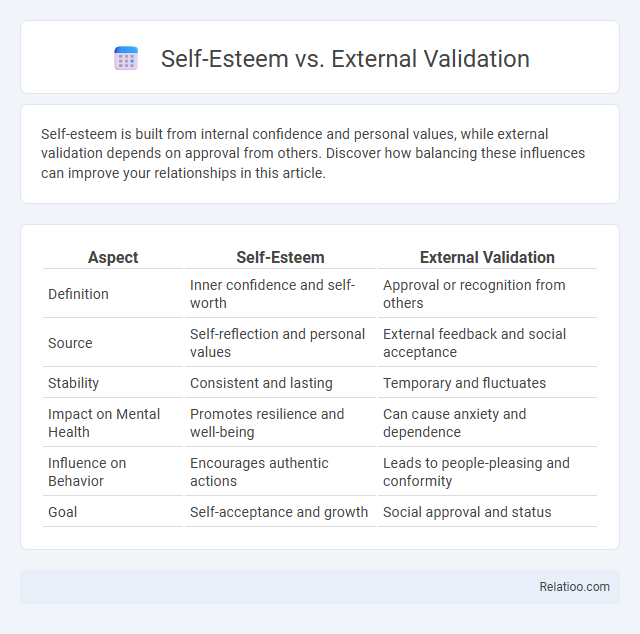Self-esteem is built from internal confidence and personal values, while external validation depends on approval from others. Discover how balancing these influences can improve your relationships in this article.
Table of Comparison
| Aspect | Self-Esteem | External Validation |
|---|---|---|
| Definition | Inner confidence and self-worth | Approval or recognition from others |
| Source | Self-reflection and personal values | External feedback and social acceptance |
| Stability | Consistent and lasting | Temporary and fluctuates |
| Impact on Mental Health | Promotes resilience and well-being | Can cause anxiety and dependence |
| Influence on Behavior | Encourages authentic actions | Leads to people-pleasing and conformity |
| Goal | Self-acceptance and growth | Social approval and status |
Understanding Self-Esteem: An Inner Resource
Self-esteem is an inner resource rooted in your self-awareness and self-acceptance, independent of external validation or externalization. It reflects your intrinsic value and confidence, shaping how you perceive challenges and relationships beyond others' opinions. Cultivating self-esteem strengthens emotional resilience and promotes authentic self-worth that isn't contingent on external factors.
What is External Validation?
External validation refers to the approval, recognition, or acceptance that you receive from others, impacting your sense of worth and self-esteem. Relying heavily on external validation can undermine your inner confidence and lead to a dependence on outside opinions rather than fostering authentic self-esteem. Understanding this dynamic is crucial to developing a balanced self-perception that prioritizes internal validation over external sources.
The Psychology Behind Self-Esteem
Self-esteem is deeply rooted in an individual's internal appraisal of self-worth, shaped by personal beliefs and emotional resilience rather than the fluctuating opinions of others. External validation depends on social feedback and approval, which can momentarily boost confidence but often leads to dependence and vulnerability when absent. Externalization refers to projecting internal conflicts onto outside factors, hindering genuine self-esteem development by avoiding self-reflection and responsibility.
Causes and Consequences of Seeking External Validation
Seeking external validation often stems from low self-esteem and an overreliance on others' opinions to define self-worth, leading to a cycle of emotional dependency and vulnerability. This externalization of validation causes fluctuations in confidence, making Your self-image contingent on fluctuating external approval rather than internal assurance. The consequences include increased anxiety, reduced authenticity, and difficulty achieving genuine self-acceptance and personal growth.
Self-Esteem vs External Validation: Key Differences
Self-esteem refers to an individual's intrinsic sense of worth and confidence, independent of others' opinions, while external validation depends on approval, praise, or recognition from others to feel valued. High self-esteem promotes resilience and inner stability, whereas reliance on external validation often leads to vulnerability and emotional fluctuations based on external feedback. Understanding these key differences helps foster self-acceptance and reduces dependency on outside approval for personal happiness.
How External Validation Influences Self-Worth
External validation significantly impacts self-worth by shaping how you perceive your value based on others' opinions rather than internal beliefs. When your self-esteem relies heavily on external feedback, fluctuations in approval can lead to emotional instability and diminished confidence. Cultivating intrinsic self-esteem reduces dependence on external validation, fostering a more resilient and authentic sense of self-worth.
The Impact of Social Media on Validation Needs
Social media platforms amplify the reliance on external validation by encouraging users to seek likes, comments, and shares as measures of self-worth, often undermining authentic self-esteem development. This externalization of approval shifts the focus away from internal validation, making individuals more susceptible to mood fluctuations and anxiety based on online feedback. Studies show that excessive social media use correlates with decreased self-esteem and increased dependency on external affirmation, impacting mental health and personal identity.
Building Authentic Self-Esteem
Building authentic self-esteem requires focusing on your internal values and self-awareness rather than relying on external validation or the tendency to externalize self-worth. Genuine confidence emerges from embracing your unique strengths and accepting imperfections without dependency on others' approval. Cultivating this internal foundation helps you maintain resilience and emotional stability amid external pressures.
Breaking Free from External Approval
Breaking free from external approval requires cultivating genuine self-esteem rooted in your internal values and beliefs rather than relying on fluctuating external validation. Externalization often leads to dependency on others' opinions, which can undermine your confidence and distort your self-worth. Embracing introspection and self-acceptance empowers you to build lasting self-esteem independent of outside influence.
Practical Strategies for Nurturing Inner Confidence
Cultivating inner confidence involves prioritizing self-esteem through daily affirmations and mindfulness practices that reinforce personal worth independent of external opinions. Reducing reliance on external validation requires setting clear personal goals and celebrating small achievements to internalize success and build resilience. Managing externalization entails recognizing emotional triggers and practicing self-reflection to separate internal feelings from external circumstances, fostering greater emotional autonomy and strength.

Infographic: Self-esteem vs External Validation
 relatioo.com
relatioo.com